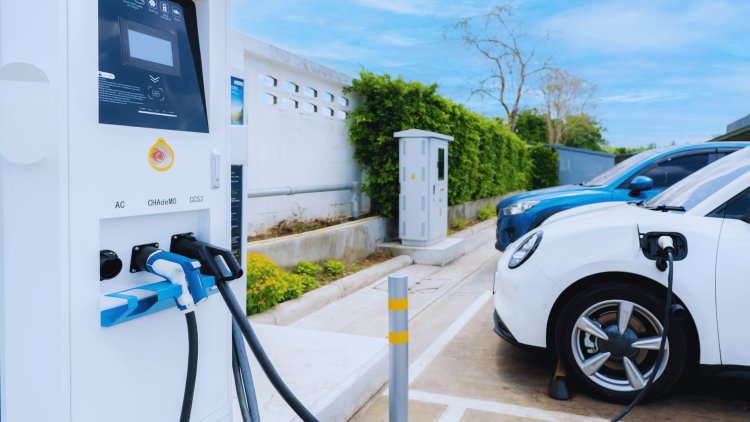Hybrid vs. Electric: Which One Suits You Best?
Choosing between a hybrid and an electric vehicle (EV) can be challenging, especially with the rapidly evolving automotive landscape.
Share this Post to earn Money ( Upto ₹100 per 1000 Views )

Choosing between a hybrid and an electric vehicle (EV) can be challenging, especially with the rapidly evolving automotive landscape. Both types of vehicles offer distinct advantages and cater to different needs and preferences. Here’s a detailed comparison to help you decide which one might be the best fit for you.
1. Understanding the Basics
Hybrid Vehicles:
- Definition: Hybrids combine a traditional internal combustion engine (ICE) with an electric motor. They can run on gasoline, electricity, or a combination of both.
- Types: There are two main types: full hybrids (which can drive on electric power alone for short distances) and plug-in hybrids (which have larger batteries and can drive longer distances on electric power alone).
Electric Vehicles (EVs):
- Definition: EVs are powered entirely by electricity. They have no internal combustion engine and rely solely on electric motors and batteries.
- Types: Includes battery electric vehicles (BEVs) that run purely on electricity, and range-extended electric vehicles (REEVs) that use a small gasoline engine to generate electricity to extend the range.
2. Fuel Efficiency and Driving Range
Hybrids:
- Fuel Efficiency: Hybrids offer excellent fuel efficiency compared to traditional gasoline vehicles. They use regenerative braking to recharge the battery, which helps reduce fuel consumption.
- Driving Range: They have a driving range similar to conventional cars, as they use gasoline as well as electricity. For instance, a typical hybrid can cover 400-600 miles on a full tank and battery charge.
EVs:
- Fuel Efficiency: EVs are extremely efficient because they convert a higher percentage of energy from the battery into driving power compared to ICE vehicles.
- Driving Range: The range of EVs varies widely. Modern EVs can cover between 200 to 400 miles on a full charge, with some high-end models exceeding this range. However, range can be affected by driving habits and environmental conditions.
3. Charging and Refueling
Hybrids:
- Refueling: Hybrids can be refueled at any gas station, making long trips easier and reducing concerns about running out of power.
- Charging: Full hybrids do not require external charging as their batteries are charged through the engine and regenerative braking. Plug-in hybrids can be charged via a standard electric outlet or dedicated charging station.
EVs:
- Refueling: EVs need to be recharged at home or at public charging stations. Charging times vary, with fast chargers providing significant charge in about 30 minutes, while home charging can take several hours.
- Charging Infrastructure: The availability of charging stations is improving, but it is still less widespread than gas stations, especially in rural areas. However, many EV owners install home chargers for convenience.
4. Environmental Impact
Hybrids:
- Emissions: Hybrids produce fewer emissions compared to conventional vehicles because they use electric power to reduce the load on the gasoline engine. However, they still emit some pollutants when operating on gasoline.
EVs:
- Emissions: EVs produce zero tailpipe emissions, making them an environmentally friendly option. Their overall impact depends on the source of the electricity used for charging. If charged with renewable energy, their environmental benefits are significantly enhanced.
5. Cost Considerations
Hybrids:
- Initial Cost: Hybrids generally have a lower purchase price compared to EVs. They are also often eligible for tax incentives and rebates.
- Operating Costs: While hybrids can have higher maintenance costs than traditional vehicles due to their complex powertrains, they save money on fuel. Repair costs are typically lower than those for EVs due to fewer specialized components.
EVs:
- Initial Cost: EVs tend to have a higher upfront cost, though prices are decreasing as technology advances. They are often eligible for more substantial government incentives.
- Operating Costs: EVs have lower operating costs due to fewer moving parts and less frequent maintenance needs. Electricity is generally cheaper than gasoline, resulting in lower fuel costs.
6. Driving Experience
Hybrids:
- Driving Dynamics: Hybrids offer a balance of performance and efficiency. They often provide smooth and responsive driving experiences, with the added benefit of regenerative braking.
- Noise Levels: They can be noisier than EVs, particularly when the gasoline engine is running.
EVs:
- Driving Dynamics: EVs are known for their smooth, quiet operation and instant torque, which results in quick acceleration and a quiet driving experience.
- Noise Levels: EVs are generally quieter than hybrids and conventional vehicles, contributing to a more serene driving environment.
7. Practical Considerations
Hybrids:
- Ideal For: Drivers who want to benefit from improved fuel efficiency without changing their driving habits or lifestyle significantly. Hybrids are also suitable for those who frequently drive long distances and need the flexibility of refueling at gas stations.
EVs:
- Ideal For: Drivers who are committed to reducing their carbon footprint and are willing to adapt to new charging infrastructure. EVs are well-suited for those with short commutes or access to reliable home charging options.
Conclusion
Both hybrid and electric vehicles offer unique advantages depending on your needs and lifestyle. Hybrids are a great choice if you’re looking for a vehicle that combines fuel efficiency with the convenience of traditional refueling. On the other hand, EVs are ideal if you’re aiming for zero emissions and are ready to embrace the benefits of fully electric driving. Consider factors such as driving range, charging infrastructure, cost, and environmental impact to determine which type of vehicle best suits your needs and preferences.















